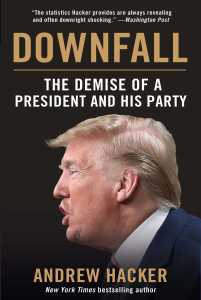 Nearly every poll says the same thing: Joe Biden is beating Donald Trump nationally, but it’s closer in the swing states, and by no means should we rule out a second term for Trump. For those of us who believe Trump represents an existential threat, it’s a nerve-wracking prospect, conjuring up nightmares from 2016 all over again.
Nearly every poll says the same thing: Joe Biden is beating Donald Trump nationally, but it’s closer in the swing states, and by no means should we rule out a second term for Trump. For those of us who believe Trump represents an existential threat, it’s a nerve-wracking prospect, conjuring up nightmares from 2016 all over again.
But not to worry, writes Andrew Hacker in his new book, “Downfall: The Demise of a President and His Party.” Hacker, a political scientist based at Queens College who’s best known for his book “Two Nations: Black and White, Separate, Hostile, Unequal,” argues that 2016 was a fluke that won’t be repeated. He opens thusly:
There is not even a long-odds chance that Donald Trump will gain a second term. Nor is this wishful thinking. Compelling evidence abounds that anyone the Democrats nominate will win the popular vote, and by a margin to easily carry the Electoral College. Republicans down the ballot will suffer a similar demise, losing even more House seats, and very likely the Senate.
Among other things, Hacker argues that Hillary Clinton was a uniquely unappealing candidate who combined arrogance with a sense of entitlement (I don’t agree, but I know plenty of people who do); that massive Democratic turnout in the 2018 midterm elections foreshadows a blue wave this November; and that the electorate continues to favor the Democrats demographically as it becomes less white, less straight and better educated.
Hacker wrote “Downfall” before the Democrats had settled on Biden as their presumptive nominee and before anyone had heard of COVID-19. It remains to be seen whether Biden was the best choice to do battle with Trump. But polling shows that the president’s cruel and incompetent response to the pandemic is harming whatever chances he had of being re-elected.
The argument that Hacker offers is in line with that of Rachel Bitecofer, a political scientist based at the Niskanen Center, a Washington think tank. Bitecofer made a splash earlier this year with a new election model that said Trump has virtually no chance of winning, mainly because unusually high Democratic turnout this fall is assured.
“In the polarized era, the outcome isn’t really about the candidates,” Bitecofer was quoted as saying in Politico Magazine. “What matters is what percentage of the electorate is Republican and Republican leaners, and what percentage is Democratic and Democratic leaners, and how they get activated.”
Another political scientist, Thomas Patterson of the Harvard Kennedy School, argues in a new book that the Republican Party has guaranteed its demise by moving to the extreme right, by ignoring demographic trends, by taking dictation from right-wing media, by showering tax cuts upon the wealthy, and by disregarding democratic norms such as voting rights, through which “it has made lasting enemies and created instruments of power that can be used against it.”
In so doing, Patterson writes in “Is the Republican Party Destroying Itself?,” the GOP has abdicated its role as the necessary center-right counterbalance to the center-left Democrats.
All of this is encouraging if you want to see Trump leave office next January. And the data suggesting that he’ll lose is compelling. But we’ve all been here before, haven’t we? Patterson, after all, is also the author of the definitive analysis of how media malpractice contributed to Trump’s election four years ago — and, as Washington Post media columnist Margaret Sullivan laments, here we go again. So let’s see how it plays out.
Talk about this post on Facebook.






